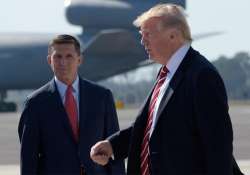Donald Trump knew NSA Flynn misled VP, White House weeks before ouster: Officials
It seems all is not well in Donald Trump’s Presidency. After Michael Flynn resigned from the National Security Adviser (NSA) post, it has come into light that the just six days into his presidency, the President was informed that his NSA had misled V

It seems all is not well in Donald Trump’s Presidency. After Michael Flynn resigned from the National Security Adviser (NSA) post, it has come into light that just six days into his presidency, the President was informed that his NSA had misled Vice President (VP) Mike Pence about contacts with Russia.
According to the White House officials, Trump kept his No. 2 in the dark and waited nearly three weeks before ousting the aide, citing a slow but steady erosion of trust.
“President Donald Trump asked for National Security Adviser Michael Flynn's resignation because he had lost confidence in him after revelations regarding his contacts with Russia prior to the inauguration,” White House Press Secretary Sean Spicer told reporters on Tuesday.
Flynn was interviewed by the FBI about his telephone conversations with Russia's Ambassador to the US, a sign his ties to Russia had caught the attention of law enforcement officials. But in the White House's retelling of Flynn's stunning downfall, his error was not that he discussed US sanctions with the Russian before the inauguration, but the fact that he denied it for weeks, apparently misleading Vice President and other senior Trump aides.
White House officials said they conducted a thorough review of Flynn's interactions, including transcripts of calls secretly recorded by US intelligence officials, but found nothing illegal.
Pence, who had vouched for Flynn in a televised interview, is said to have been angry and deeply frustrated.
"The evolving and eroding level of trust as a result of this situation and a series of other questionable incidents is what led the president to ask General Flynn for his resignation," White House spokesman Sean Spicer said.
Flynn, however, said that ‘there were no lines crossed in his conversations’ with Russian Ambassador Sergey Kislyak.
Flynn, a decorated general who advised Trump on foreign policy during the election campaign, held conversations with Kislyak during the transition period prior to the mogul's inauguration and even before the November 8 election.
Some of those telephone calls were intercepted by the US intelligence services and, according to the transcripts, Flynn and the Russian Ambassador spoke about the sanctions on the Kremlin that former President Barack Obama imposed before leaving the White House in reprisal for alleged Russian interference in the US election.
Flynn resigned on Monday evening, writing in his resignation letter that he inadvertently briefed the Vice President-elect and others with incomplete information regarding my phone calls with the Russian Ambassador.
On Tuesday, Spicer categorically denied that Trump had instructed Flynn to discuss the sanctions with the Russian envoy.